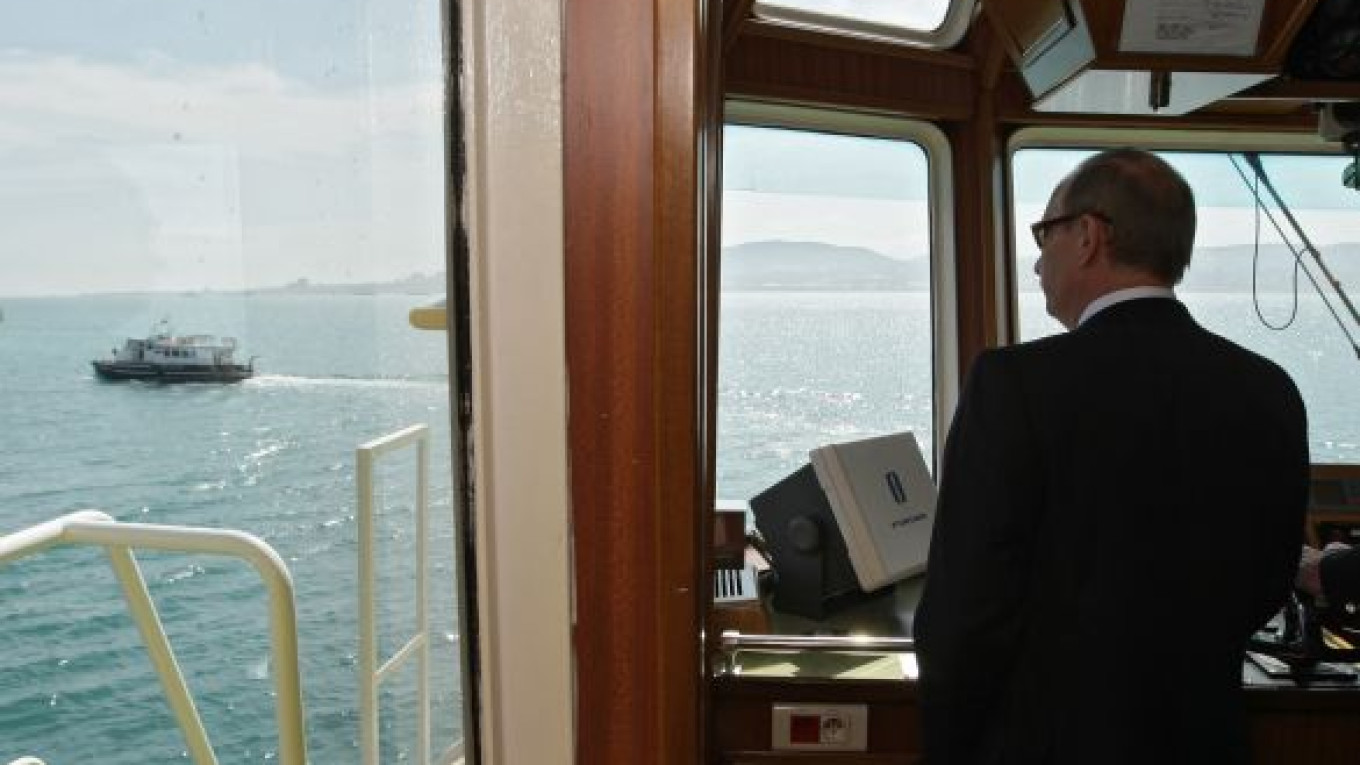Prime Minister Vladimir Putin has toured the construction site for Russia's own naval base in the Black Sea on a trip that emphasized the government's commitment to consummate the $3 billion project despite securing a longer lease for the base in Ukraine.In a port near Novorossiisk, Putin listened to a progress report on Friday that said military contractors would complete the harbor's conversion for naval needs in 2020, three years after the current Ukrainian lease would have expired if it hadn't been for the new deal.
Russia will continue with its backup plan even after Ukraine's new, more Moscow-friendly President Viktor Yanukovych agreed last month to let the Russian warships stay in Sevastopol through 2042, a Cabinet spokesman said Monday.
“Whatever agreements we might have with Ukraine, the matters of strategic security — precisely such as deploying the fleet on our own territory — enjoy priority,” said the spokesman, Dmitry Peskov.
Work started in 2005 on piers and wave cutters for the Russian base, located in rougher and colder waters than Sevastopol, and the final price tag is expected to reach 92 billion rubles ($3 billion). Putin stressed on Friday that engineers should make the structures highly robust in light of the accident in nearby Sochi where high waves and gale-force winds wiped out much of a new port in December.
“We are not going to have anything like that,” said Nikolai Asbroskin, director of the Federal Agency for Special Construction, which is in charge of the project. “We have had a storm of near gale-force winds. Not a single pile swayed.”
The Black Sea Fleet will be able to deploy as many as 80 warships in Novorossiisk. It now operates 52 warships out of Sevastopol and plans to boost that number.
With the trip to the Russian base under construction, Putin sent a political message that Russia would continue to take precautions against potential future changes in the Ukrainian government, said Matthew Rojansky, deputy director of the Carnegie Russia and Eurasia program. He likened the recent deal to swap a longer base lease for cheaper Russian gas to a classic Middle East peace agreement.
“On the one side, you are trading actual money and actual concessions and, on the other side, you are trading promises,” he said by telephone from Washington. “The promise is, 'You guys can stay.' But what happens if the winds of political change blow in?”
If Yanukovych loses the next presidential election in 2015, the new government may secure a court ruling banning the longer lease as unconstitutional and force the fleet out, perhaps with some financial compensation, Rojansky said.
“If the sovereign government of Ukraine says you need to leave, then Russia needs to have a backup option,” he said.
Anatol Lieven, an international studies professor at King's College in London, said Russia needed a reserve base to forestall Ukraine's possible threats to reverse the deal unless it gets more concessions. Otherwise, the Novorossiisk base makes no sense, he said.
“If they are going to keep Sevastopol until 2042, they don't really need another base in the Black Sea,” he said, suggesting that Russia could use the new base as a civilian port or delay construction eventually. “If I were one of the contractors to build the Novorossiisk base, I wouldn't be feeling too confident at the moment.”
Peskov said the government planned no changes in the construction schedule. He said he was unaware whether the harbor would be fit for commercial ships in the event that the Navy didn't need the base.
Rojansky, who traveled to Sevastopol a week ago, said the Russian warships there had seen better times.
“People aren't kidding when they say these things are rusted hunks of junk,” he said. “There are two submarines in the fleet, and one of them is under repair and the other one literally has holes rusted in it and you can't use it for training, which is kind of ironic when you consider that submarine warfare is a big deal in the Black Sea.”
A Message from The Moscow Times:
Dear readers,
We are facing unprecedented challenges. Russia's Prosecutor General's Office has designated The Moscow Times as an "undesirable" organization, criminalizing our work and putting our staff at risk of prosecution. This follows our earlier unjust labeling as a "foreign agent."
These actions are direct attempts to silence independent journalism in Russia. The authorities claim our work "discredits the decisions of the Russian leadership." We see things differently: we strive to provide accurate, unbiased reporting on Russia.
We, the journalists of The Moscow Times, refuse to be silenced. But to continue our work, we need your help.
Your support, no matter how small, makes a world of difference. If you can, please support us monthly starting from just $2. It's quick to set up, and every contribution makes a significant impact.
By supporting The Moscow Times, you're defending open, independent journalism in the face of repression. Thank you for standing with us.
Remind me later.


